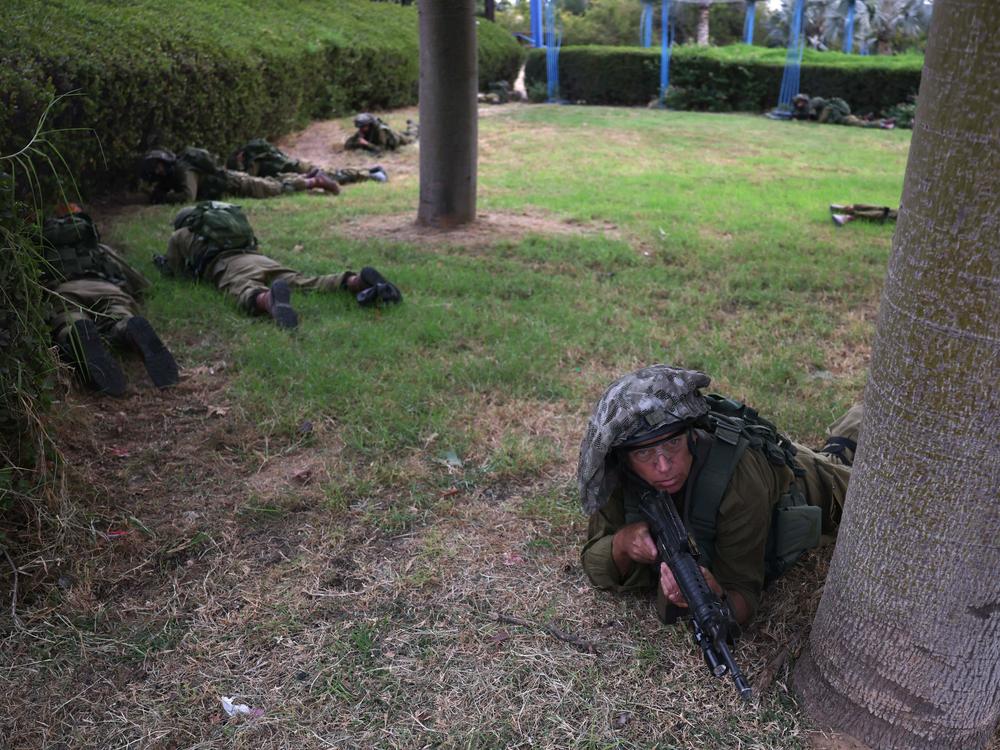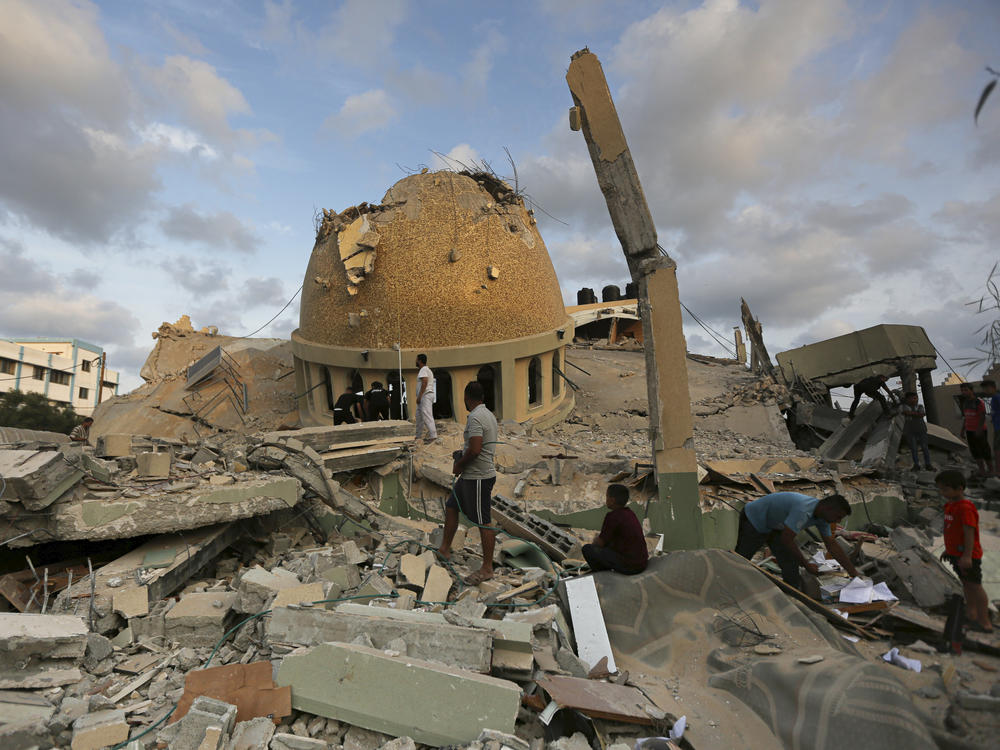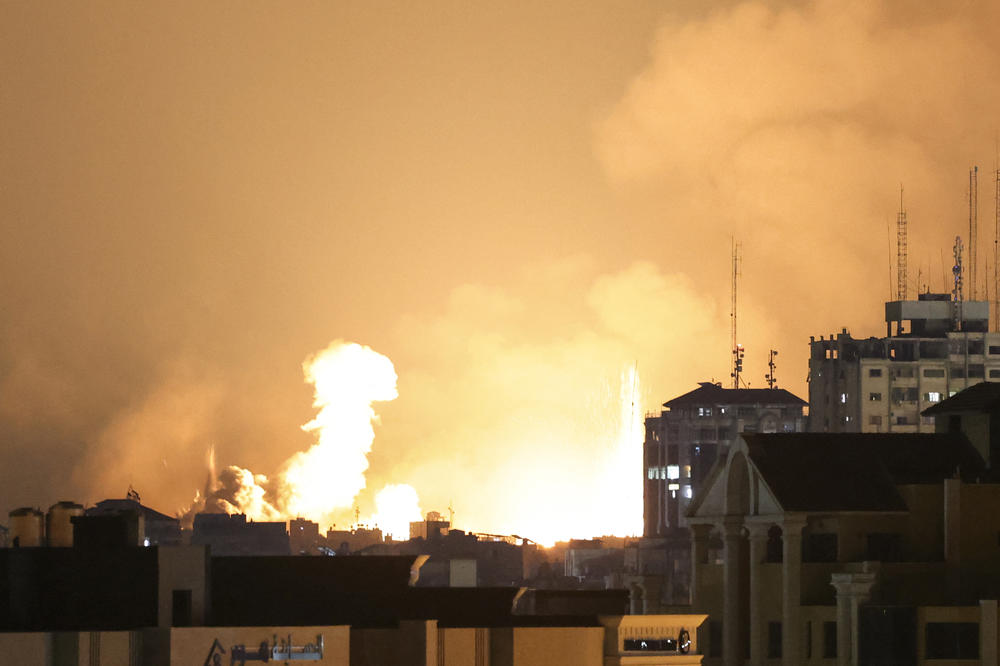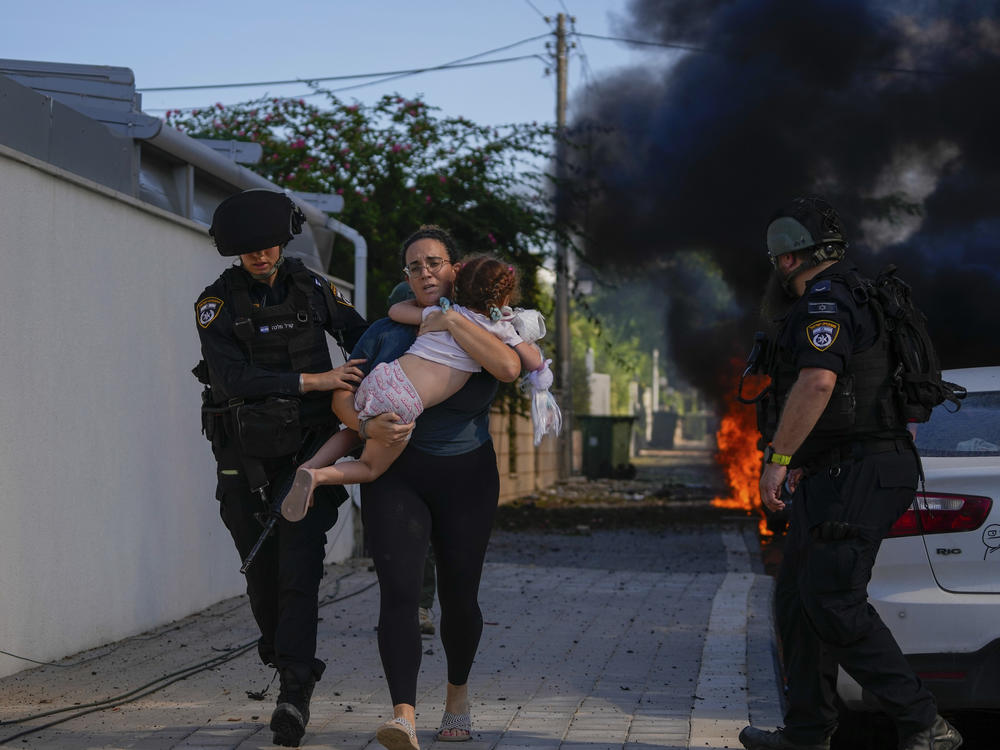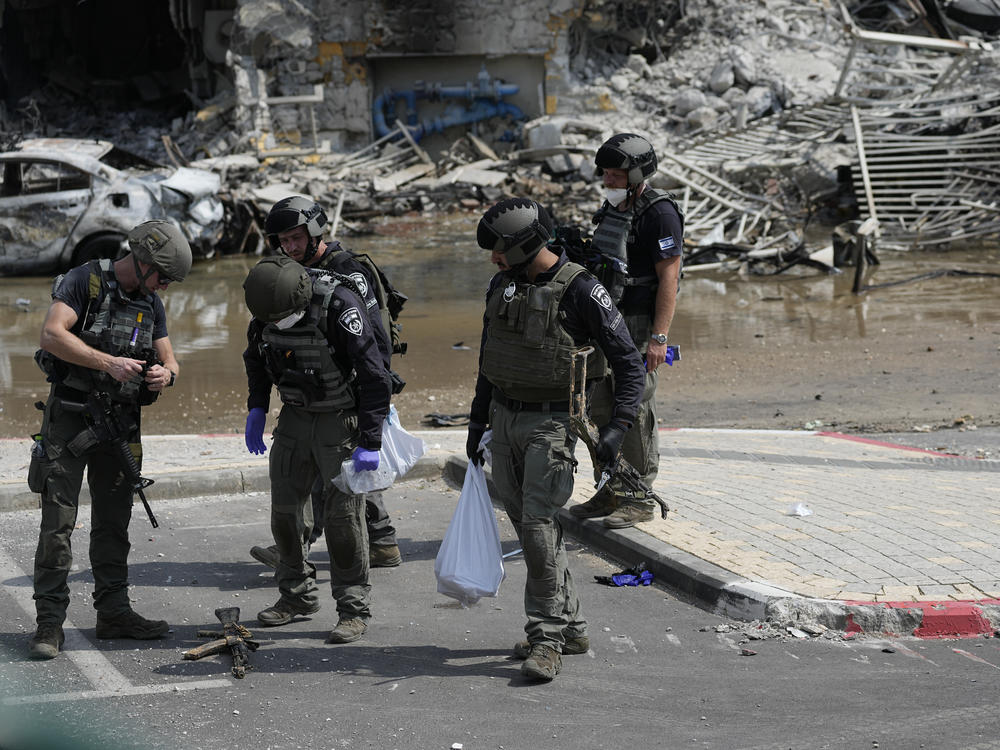Section Branding
Header Content
Israel is trying to regain full control of its territory following Hamas attack
Primary Content
Updated October 9, 2023 at 4:13 AM ET
The Israeli military said Monday it was still battling Hamas militants in several locations inside Israel's borders — on the third day after the attack from Gaza by hundreds of Hamas fighters.
A military spokesman said there are still breaches in the barrier between the Gaza Strip and Israel where militants could be entering the country. "We thought this morning we'd be in a better place," said Lt. Col. Richard Hecht, one of the army's spokesmen.
Israeli media reported more than 700 people were killed by Hamas. The Associated Press reported that militants claimed to have taken some 130 captives — including women and children. The figure is unconfirmed.
Meanwhile, the Israeli military said it has struck 1,000 targets in the Gaza Strip. Palestinian health officials say more than 436 people have been killed, including 78 children and 41 women. Around 2,300 have been injured. "Where are the international community's responses to this?" the ministry said Sunday. Seven Palestinians were also reported killed in the West Bank.
On Sunday, Israel conducted hundreds of air strikes – hitting apartment buildings and Hamas members' homes. Pictures show rubble surrounding a mosque that was destroyed in an Israeli air strike in Khan Younis in the Gaza Strip.
"We are going to respond very, very severely to this," Hecht said earlier Sunday. "In a way, this is our 9/11."
Israel Defense Forces said its aircraft attacked two "operational situation rooms" used by Hamas inside mosques in Gaza.
Israel says Hamas fighters came in from some 29 points from Gaza to attack towns and military bases.
The military confirms that Israelis were taken hostage back to Gaza but has not said how many. Israel Defense Forces spokesperson Jonathan Conricus said "a very large amount" of people were taken, including women, children, infants, elderly and disabled people.
In the north of the Israel, there have been strikes exchanged across the border with Lebanon, raising alarm at heightening regional tensions. Israel struck a site in Lebanon, after mortar fire into Israel that was claimed by the Hezbollah militant group. Hezbollah's involvement opens up the possibility of a multi-front conflict involving Israel, Gaza and Lebanon.
The surprise assault began Saturday at dawn
Early Saturday, at 6:30 a.m. local time, Palestinian militants launched a large-scale surprise attack from the blockaded Gaza Strip on civilian and military targets in Israel. They infiltrated using paragliders, an amphibious operation on the Mediterranean Sea, and on land, Hecht told reporters.
A border fence was breached with explosives — and also with heavy equipment, according to videos from the scene.
Simultaneously, Palestinian militants in Gaza fired heavy barrages of rockets toward Israel — more than 3,000 rockets throughout the day, according to the Israel Defense Forces. Air raid sirens and loud booms were heard in Tel Aviv, Jerusalem and across central and southern Israel.
Late on Saturday, Israeli Prime Minister Benjamin Netanyahu vowed in a TV address that Israel will "reach into every place Hamas is hiding" and turn those locations into ruins. Israel's military is calling up reservist soldiers, reinforcing positions and launching airstrikes on targets in Gaza. Early on Monday, IDF spokesperson Conricus said the military has "amassed around 100,000 reserve troops who are currently in southern Israel."
Hamas, the Islamist militant group, took control of Gaza in 2007.
Anyone in areas where Hamas operates in the Gaza Strip should "leave those places now," Netanyahu said. He added, "Israel will settle the score with anyone who harms them."
But for some 2 million Palestinians living in Gaza, leaving Hamas-linked areas isn't so simple. For more than 16 years, the Gaza Strip has been under a blockade by Israel and Egypt that restricts the movement of people and goods in and out of the territory.
Countries in the Arab world and beyond react to the unrest
There are fears the brutality could spread. An Egyptian policeman opened fire on Israeli tourists Sunday in the Mediterranean city of Alexandria, killing at least two Israelis and one Egyptian, local media reported.
Powers in the region have issued calls for a stop to the violence. The Saudi Foreign Ministry issued a statement calling for "an immediate end to the escalation of the conflict."
Saudi Foreign Minister Prince Faisal Bin Farhan spoke with Secretary of State Antony Blinken. A Saudi statement said the kingdom rejects the targeting of civilians, and all sides should respect international humanitarian law.
In Iran, hardliners have been incensed for months over reports that Saudi Arabia might establish diplomatic ties with Israel. In Tehran, the Foreign Ministry spokesman referred to Israeli visits to Jerusalem's Al-Aqsa Mosque as a "desecration" and called the attack a "spontaneous move by ... resistance groups."
The U.S. has responded in support of Israel. President Biden said he spoke with Netanyahu Saturday morning, telling him the U.S. is "ready to offer all appropriate means of support" to Israel. The two spoke again Sunday for the second time this weekend.
"Terrorism is never justified," Biden said in a statement on Saturday. "Israel has a right to defend itself and its people."
The president said his administration's "support for Israel's security is rock solid and unwavering."
Blinken told CNN Sunday morning that Americans are reportedly among those killed and among the hostages taken to Gaza, but officials were still working to verify those reports.
Defense officials also announced Sunday that the U.S. was sending the USS Gerald R. Ford carrier strike group to the Eastern Mediterranean in support of Israel.
High-level U.S. officials are in communication with counterparts in Israel and regional allies, from Blinken to Defense Secretary Lloyd Austin — who said the Pentagon will continue to consult with Israel to make sure it has the support it needs.
What additional support, if any, is uncertain, U.S. officials tell NPR. The United States provides billions of dollars each year in assistance to Israel and helped the country build its Iron Dome missile defense system.
The U.S. Embassy in Jerusalem urged all sides to refrain from violence and retaliatory attacks, stating, "Terror and violence solve nothing."
James Doubek contributed reporting.
Copyright 2023 NPR. To see more, visit https://www.npr.org.
